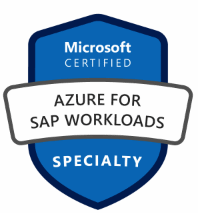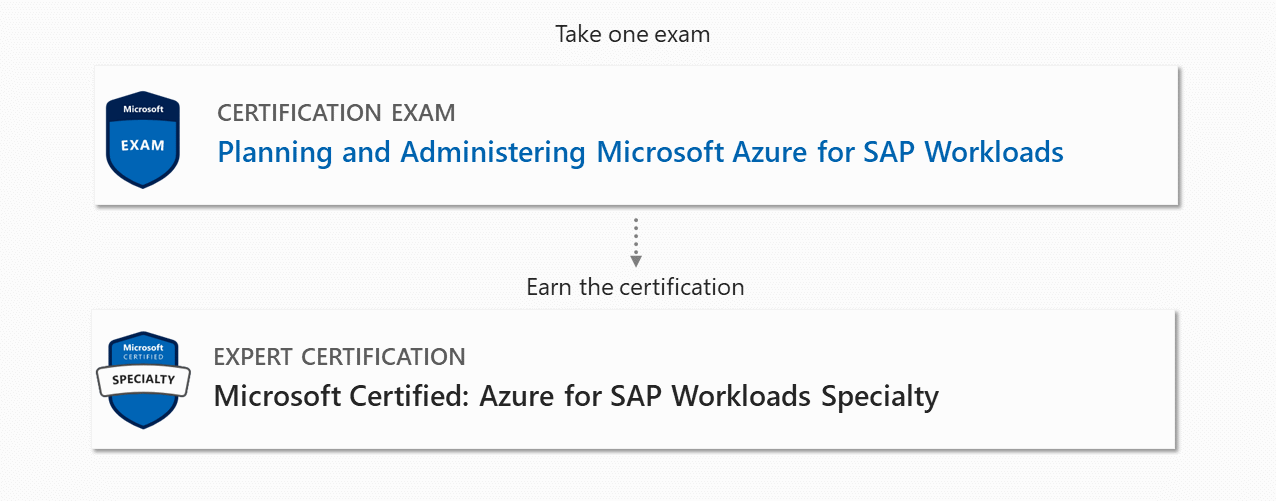Cloud Certifications : Azure for SAP Workloads Specialty (AZ-120)
Jun 23, 2020 • 6 Minute Read
Introduction
This guide provides information and resources to prepare for the Microsoft certification, Azure for SAP Workloads Specialty. It also gives you some tips and recommendations based on the experiences of engineers who are also certified in Microsoft Azure.
Who Is This Certification For?
This certification is for Azure administrators and/or solution architects who migrate SAP solutions on Azure and are willing to manage the cloud services that span storage, networking, and compute cloud capabilities.
If you are an IT professional experienced in Azure and SAP solutions, and are knowledgeable in the SAP Landscape Certification process and industry standards that are specific to the long-term operation of a SAP solution, this certification is perfect for you.
The Exam
There is only one required exam, AZ-120: Administering Microsoft Azure for SAP Workloads, to earn the Azure for SAP Workloads Specialty certification.
As with all Microsoft exams, you will have between 40 and 50 questions (possibly including a few use cases to study), and the passing score is 700 over 1000. Assuming that all questions have the same weight, about 35 of the 50 questions need to be answered correctly.
The exam is available in English, Japanese, Chinese (Simplified), and Korean. Its length is 210 minutes.
Prerequisites
Significant experience (between one and two years) in building and deploying solutions on Azure is recommended in order to best understand all the skills to be assessed during the exam. As it is a Specialty certification, it is also strongly recommended that candidates for this exam have an Azure Administrator or Azure Architect certification, in addition to SAP HANA and Linux certifications.
Skills Measured
The AZ-120 exam measures the ability to candidates to accomplish the following tasks :
- Migrate SAP Workloads to Azure
- Create an inventory of existing SAP landscapes
- Design a migration strategy
- Design an Azure Solution to Support SAP Workloads
- Design a core infrastructure solution in Azure to support SAP workloads
- Design Azure infrastructure services to support SAP workloads
- Design a resilient Azure solution to support SAP workloads
- Build and Deploy Azure for SAP Workloads
- Automate deployment of Virtual Machines (VMs)
- Implement and manage virtual networking
- Manage access and authentication on Azure
- Implement and manage identities
- Monitor SAP workloads on Azure
- Validate Azure Infrastructure for SAP Workloads
- Perform infrastructure validation check
- Perform operational readiness check
- Operationalize Azure SAP Architecture
- Optimize performance
- Migrate SAP workloads to Azure
The exams change periodically, so this list is not definitive or exhaustive.
Preparation Materials
Pluralsight offers relevant learning paths on Azure:
- Planning Microsoft Azure Solutions
- Planning Microsoft Azure Infrastructure
- Managing Microsoft Azure Networking
- Managing Microsoft Azure Storage
Some learning paths are also proposed by Microsoft to gain the skills needed to become certified:
-
Free online training:
-
Microsoft Official Instructor-led training course:
Compensation and Employment Outlook
According to Microsoft:
Upon earning a certification, 23% of Microsoft certified technologists reported receiving up to a 20% salary increase. What’s more, certified employees are often entrusted with supervising their peers—putting them on the fast track for a promotion. On average, certified employees earn 15% more than those without certification and are nearly 20% more productive.
This certification is relatively new, but according to Indeed, the average salary for a cloud engineer is US$120,000 per year in the United States.
Conclusion
As already mentioned, this certification is a speciality for Azure Administrators or Architects to demonstrate they have deep technical skills and experience in managing industry solutions. That's a real plus if you work with SAP under Azure and/or if you are already Azure certified.
Microsoft certifications have been around for many years and are highly valued in the industry. Historically, they have taken place in approved and supervised examination centers, but for some time now it has also been possible to take them from home or the office with remote monitoring by a supervisor (you must be absolutely alone during the examination, have the webcam and microphone open at all times, no paper/pencil at your disposal, etc.). This option allows everyone to be able to take this exam regardless of health conditions, but in all cases, before you attend, make sure you are well prepared and able to check off all of the competencies that may be assessed during the exam.
This achievement requires a lot of effort on your part and you will have well deserved your badge!
I wish you all the best in your certification journey!
Advance your tech skills today
Access courses on AI, cloud, data, security, and more—all led by industry experts.





